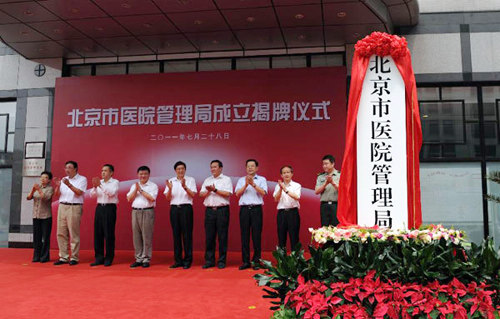|
 |
|
The unveiling ceremony of the Beijing Hospital Management Bureau is held in Beijing on July 28 (XINHUA) |
Beijing established a new medical authority on Thursday as part of an ongoing project to change the way the nation's public hospitals operate.
The creation of the Beijing Hospital Management Bureau will help the country to reform its public hospitals and create a modernized hospital management system, Health Minister Chen Zhu said at the bureau's opening ceremony.
The bureau will be in charge of asset management and supervision, management recruitment and training and operational reforms for the city's 22 major public hospitals, according to Mao Yu, deputy chief of the bureau.
The bureau will be led by Fang Laiying, who is also chief of the Health Bureau of Beijing Municipality.
Beijing has been approved to be the 17th city to test government-run hospital reform programs, according to the Ministry of Health. The reform programs are aimed to ease the public's concern over rising medical costs.
The 17 cities are required to establish a reasonable, effective and optimized medical service system and to encourage medical workers to provide the public with safe, effective, convenient and affordable medical services.
The Chinese Government unveiled an 850-billion-yuan ($127.7 billion) three-year plan for health care reform in 2009. The plan aims to provide universal and affordable medical services to the country's 1.3 billion people.
Public hospital reform projects will include favorable policies for public hospitals in the areas of city planning, medical staff training and funding.
In China, public hospitals used to be similar to government-aided institutions in that employees were paid based on their job titles. A bonus system was later introduced to encourage doctors to improve their performance. The system rewarded doctors based on the total monetary value of the prescriptions they wrote.
However, this system only led to an increase in the number of prescriptions issued, creating high cost burdens for patients and damaging their health, said Wang Shan, president of the Peking University People's Hospital.
"It's necessary to introduce business management systems to hospitals, as this will definitely improve the service quality of medical personnel," said Wang.
Han Xiaofang, director of Beijing's medical reform office, said that a new performance evaluation system will focus on quality, safety, cost control and customer satisfaction.
"Doctors issuing excessive prescriptions will be punished," said Han.
According to Han, a private medical management group has been working since last year to manage a hospital in the city's Mentougou district as part of the reform program.
The experience they have offered will be important for reforms instituted in the city's other hospitals in the future, she said.
Wu Potao, president of the Mentougou District Hospital, said that the hospital's service efficiency and quality have greatly improved since the management group's arrival, with average medical expenses falling by 29.15 percent year-on-year to 10,211 yuan ($1,585) per hospitalized patient in the first quarter of this year.
(Xinhua News Agency July 28, 2011) | 